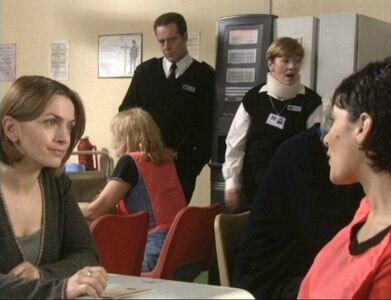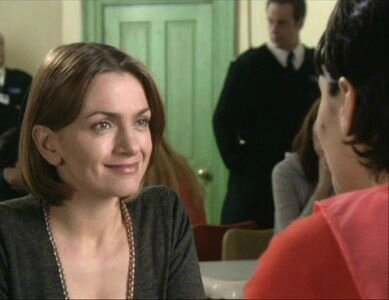LOSING IT 2-06
L'AVEU
Réalisateur : Jim O'Hanlon
Scénariste : Martin Allen
Les maux de tête de Zandra deviennent de plus en plus persistants. Elle consulte le médecin qui ne détecte qu'une tension artérielle basse et un trouble de la vision nécessitant le port de lunettes. Zandra refuse de porter ces lunettes mais elle fait un malaise et s'avère incapable de tenir un objet après celui-ci. En parallèle, Zandra est de plus en plus attirée par Dominic. Elle apprécie sa gentillesse et ses attentions et décide d'arrêter de se droguer pour lui faire plaisir.
Karen, la directrice, demande des explications à Sylvia concernant l'échange d'identités entre Barbara et Tessa. Elle lui explique que son travail laisse à désirer et lui propose de faire de la gym. Sylvia accepte, loin d'être enchantée. Elle débute les exercices avec le professeur de sport et fait rire toutes les détenues. Non motivée, elle se blesse à nouveau aux cervicales et doit reporter une minerve. Grâce à Fenner, Karen découvre que Sylvia lui ment. Elle n'a rien et, à l'extérieur, participe à des galas de danse. Karen lui conseille alors de cesser ce petit jeu et l'inscrit pour 3 mois de sport.
Josh et Crystal continuent de se voir. Le jeune homme propose à la détenue d'emménager chez lui lorsqu'elle sortira de prison. Il a en effet une chambre d'ami. Il lui offre ensuite un superbe pendentif. Crystal est heureuse. Les deux Julie, curieuses, lui demande si elle a déjà couché avec un homme et Crystal déclare qu'elle est vierge et qu'elle compte le rester jusqu'à son mariage.
Nikki partage toujours sa cellule avec Barbara. Alors qu'elles semblent plutôt bien s'entendre, Barbara apprend que Wade est lesbienne. Elle ne l'accepte pas et déclare qu'elle se sent mal à l'aise avec la jeune femme. Jim qui ne l'a jamais aimé remet Nikki à sa place et dit à Barbara qu'il lui trouvera une cellule individuelle dès que possible. Puis Nikki protège Barbara de Karen lorsque celle-ci l'accuse d'avoir fait des graffitis et déclare qu'il s'agit de Shell. A partir de cet instant, elles se réconcilient et Barbara propose même à Nikki de se faire envoyer du courrier à son nom afin qu'il ne soit pas lu par Fenner.
Helen qui avait disparu depuis sa démission revient à Larckhall. Elle rend visite à Nikki et l'encourage à faire appel de la décision du juge. Puis elle surprend Nikki à la bibliothèque et lui avoue qu'elle a un nouvel emploi. Elle va dorénavant travailler à Larkhall en indépendante. Elle étudiera les dossiers des femmes condamnées à perpétuité pour la direction régionale. Toutes les deux sont ravies de se retrouver.
Karen décide de suspendre la thérapie de groupe parce qu'elle n'a pas été soutenue par sa hiérarchie.
Shell est extrêmement perturbée par les séances de psychothérapie. Elle se met à faire des graffitis et accuse Barbara. Puis elle perd le contrôle à plusieurs reprises et accuse Fenner d'être un violeur. Elle avoue ensuite à la directrice qu'elle a couché avec son père lorsqu'elle avait 11 ans et que sa mère l'y encourageait. Après avoir été au mitard durant 4 jours, Karen décide qu'il est tant pour Shell de regagner sa cellule. Alors qu'elle demande à Dominic si la jeune femme va bien, ils la découvrent en haut de l'escalier, une corde autour du cou, demandant à Fenner de l'assassiner comme il l'a fait avec Rachel Hicks.
C'est l'heure des visites au parloir. Sylvia prend son poste d'observateur alors que quelqu'un entre. C'est Helen ! EllE est de retour ! Sylvia prend son talkie-walkie et appelle Jim pour lui dire de venir voir ça de ses propres yeux. Helen s'asseoie et fait face à une Nikki radieuse.
Nikki: I wasn't sure you'd come.
Helen: I said I would.
Nikki: Yeah. But it wasn't that long ago I thought I'd never see you again. You still looking for work?
Helen: I've got one or two irons in the fire.
Nikki: Yeah?
Helen: [sighing] I missed you, Nikki.
Nikki: Missed you. Since you left, I've ...
Helen: Well, I'm here now.
Nikki: Till you get bored of coming. Or till you meet someone else, like Trish did.
Helen: Listen. You never know what's gonna happen.
Nikki: Yeah, right. Still got nine years to do, remember?
Helen: I wanna talk to you about that. I think you should appeal.
Fenner and Hollamby n'en croient pas leurs yeux: un ex-officier qui rend visite à une condamnée !
Nikki: I don't want to be gettin' my hopes up, just to have 'em dashed.
Helen: Honestly, Nikki, there's been a lot of cases a lot more seerrrious than yours that have had a successful appeal.
Nikki: Waste of time, i'n't it?
Helen: Look. Let me put it another way. Will you do it for me?
Nikki: I'd do anything for you. You know that.
Helen: Good. Well, that's it settled. [a bell rings] I'd better go.
Nikki: I'll see you soon.
Helen: Yes, you will. Be good. And remember, we're gonna make this work. I promise.
Dans la bibliothèque : Nikki lit un roman d'Henry James The Portrait of a Lady Quelqu'un se glisse silencieusement derrière elle et l'interrompt.
Helen: [looking at the book] That's a bit heavy going for a no-hoper like you.
Nikki: What're you doing here?!
Helen : One of those irons in the fire I was telling you about.
Nikki : You ... you got a job here?
Helen : Prison Service Professional.
Nikki : What?!
Helen : I'm working for area management. Special program for women lifers. I'm back on your case. Literally.
(Sources Captures et Dialogues : Afterellen.com )
Exposing limits
How can a woman's psychological crumbling when faced with the memory of abuse, a former prison officer's visit to her inmate lover, and a protest over the lack of privacy in prison life all serve as variations on a single theme? This episode is about exposure, and the ways in which some people are more able to control the ways they expose themselves than others are. The episode also implies a moral conclusion: those characters who are most psychologically balanced and functional are those who are most in control of their self-exposure, and in fact, that control signifies each character's emotional and psychological well-being.
The most obvious storyline on this theme is the protest taken up by some of the prisoners. Inspired by Shell, the Julies and Denny take a stand in demonstrating how vulnerable the prisoners are to exposure in front of male officers, and how they are going to protect themselves from that vulnerability. They block the peepholes in their cell doors, and then purposefully allow themselves to be walked in on in a state of undress.
Every other central character in this episode also makes decisions about exposing herself. From a concrete perspective, Nikki now has a cellmate and now must wash up at the sink, change her clothes, and use the toilet in incredibly close proximity to a total stranger. As always, Nikki maintains her dignity; she is the master of being invulnerable, even when completely naked. On a more emotional level, Helen is finally ready to come visit Nikki because she's no longer scared to show other prisoners and prison officers that Nikki is special to her. Or perhaps she's been missing Nikki so much that the desire to see Nikki outweighs her fear of exposing herself. And in a more lighthearted storyline, Zandra doesn't want anyone (read: Dominic) to see her in glasses, even if it will cure her headaches, primarily because it will expose a side of her which she isn't comfortable with—the flawed, geeky side.
But the true center of this episode, the true crux of this meditation on self-exposure, is Shell. She alternates between exposing herself to the extreme (the barely-there outfit in the group therapy session, the meeting with Karen where she confesses her history of sexual abuse), and hiding herself (accusing Dominic of spying on her, switching from her revealing clothes to baggy sweatpants and sweatshirt). Everything is dysfunctional and inconsistent, because Shell doesn't really know when it's appropriate to expose herself and when it's not. It's not appropriate in group therapy, it's not appropriate to tell Karen she wants to get a knife and stab Fenner, and it's not appropriate to protect herself from Dominic, the least likely Peeping Tom at Larkhall.
The notion of performance accompanies many of the exposures in this episode. After all, no one can expose themselves without an audience. Something significant can happen, power can be asserted, when someone is willing to do something in front of an audience. Again, the "Peeping Tom" protest serves as the core, because it's really a staged performance itself. The Julies and Denny are purposefully not dressed when male officers enter their cells in order to make a point about male officers' rights to intrude on every aspect of their lives. But Shell, similarly, decides to expose herself before an audience (the therapy group), showing something (her history of sexual abuse) she had never revealed before. Shell's performativity culminates at the very end of the episode, with her dramatic appearance up on G3, an expression of rage and protest against Fenner and all abusive men.
This rebellious performance demonstrates the essence of prison: it denies them an an audience, denies them any power or clout in the outside world. It narrows their sphere of influence from the world at large to the world of the prison wing, a place in which the world at large has no interest. This is why prisoners are sent to solitary when they misbehave. In solitary they no longer have their audience on the wing, and therefore no longer assert any power. No statement can be definitive without people to witness it, so no changes can really occur in isolation. Shell can't undermine Fenner in solitary, and Helen, stuck at home in her own solitary confinement, can't begin a relationship with Nikki.
This performativity, and the notion of controlled self-exposure, offers a means for the writers to begin privileging the relationship between Helen and Nikki above all other relationships and storylines on the program. Helen and Nikki are the only two in complete control of their exposure, exposing themselves with sincerity and totally open desire. Helen was hoping to come back to work at Larkhall, yet she still comes to visit Nikki (a visit which she could have skipped altogether). But that visit indicates to Nikki (and the viewers) that Helen is willing to demonstrate an intimacy with Nikki in front of an audience. Helen's willingness enables their relationship to begin.
The show is taking on a specific political agenda here: it's taking something many viewers might find strange or immoral (a lesbian relationship) and establishing it as the most normal and moral relationship on the program. The episode draws an explicit contrast between Shell's dysfunctional sexuality and Nikki's lesbian sexuality. The scenes of Shell camping it up in group therapy, reliving her sexual abuse, are intercut with the scenes of Barbara/Fenner's homophobic confrontation of Nikki. This contrast emphasizes the irony of Barbara's homophobia, because Barbara is scared of Nikki's sexuality (which has nothing to do with Barbara, as Nikki so pointedly makes clear: she couldn't be less interested in Barbara), when we can see that Nikki's sexual and romantic behavior is quite normal in contrast to heterosexuals like Shell.
In other ways in this episode, heterosexuality is a source of trauma, while lesbian sexuality is normalized, highly functional, and enhances lives. Helen's visit directly follows the "Peeping Tom" protest against the male guards. How striking to compare the staged exposures of that protest to an actual prison officer (Helen) who is pursuing a real relationship with an inmate (Nikki). Helen and Nikki's relationship is not portrayed as perverted, as is the interest of the male officers in female inmates. In fact, this is the first scene where Helen and Nikki have a functional romantic dynamic between them, rather than a battle against Helen's inner conflict. Helen's willingness to be seen, to expose herself, and her lack of anxiety about doing so, provides a real pleasure for viewers, and for the first time we fully enjoy this lesbian romance and acknowledge it, in public, with no anxiety.





















/https%3A%2F%2Fstorage.canalblog.com%2F56%2F77%2F1179745%2F119607636_o.jpg)
/https%3A%2F%2Fstorage.canalblog.com%2F29%2F58%2F1179745%2F118642970_o.jpg)
/https%3A%2F%2Fstorage.canalblog.com%2F88%2F47%2F1179745%2F117370718_o.jpg)
/https%3A%2F%2Fstorage.canalblog.com%2F20%2F47%2F1179745%2F92838057_o.jpg)